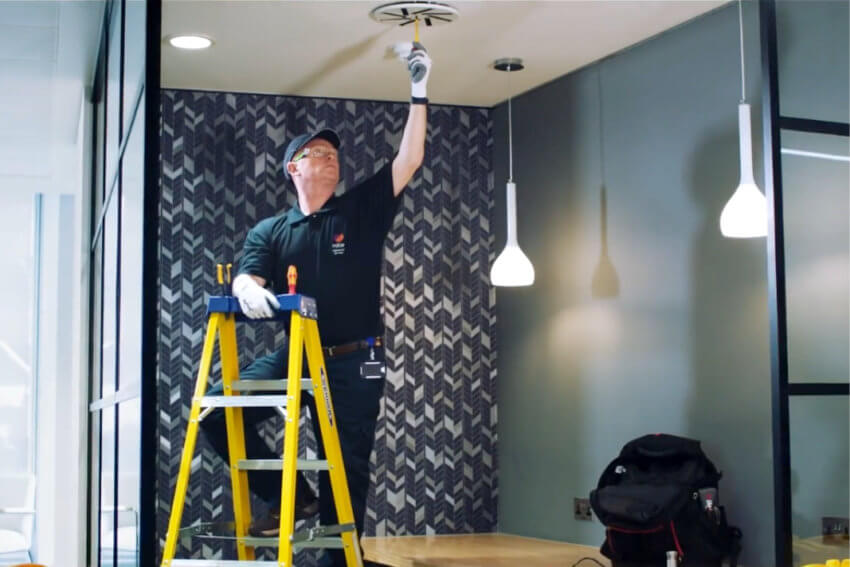How the workplace revolution is changing FM
For many people, the complications and restrictions created because of the Covid-19 pandemic are a thing of the past. However, the conversation around working practices and employee needs is ongoing. FM professionals are finding their priorities significantly changed by it.
As the definition of workspace changes, facilities management is becoming even more important to an organisation’s success. The workplace revolution is changing the scope of what lies within FM’s responsibilities.
There are several areas identified in the research for our white paper, Accelerating Facilities Transformation, which are currently front of mind for many facilities managers. Most revolve around the shift in employee needs and how to meet them.

Staying flexible during the workplace revolution
Research from Future Forum shows that 53.2% of employees in the UK are currently hybrid working, and 21.1% are fully remote. These numbers are higher than the global average and are unlikely to significantly decrease any time soon.
The potential for hybrid working is becoming a common and often non-negotiable requirement for job seekers. But concerns about productivity are making many organisations hesitant to embrace this new reality.
For many employees, remote working means increased productivity and a decrease in distractions, despite their employers’ fears. Conversely, some workers find it impossible to do their best work at home due to factors like lack of resources or an unconducive home environment. While it may be easier to choose a workstyle that is either totally remote, or always in person, the extremes don’t work for everyone.
Also, there is the potential for proximity bias. Those who go into the office may be prioritised and favoured over remote workers, simply because they are familiar faces ‘in the room’. The research also shows that parents are more concerned about proximity bias impacting their career path. This is a fear that needs to be addressed, and an unconscious bias that management actively needs to counteract.
Flexible working is just one of the issues raised by the post-pandemic workplace revolution. The four-day work week is another policy championed in the name of working more flexibly, but no less efficiently. Both involve trusting employees with more control over their time, and space, and supporting them at home and in the office.
FM executives must be equipped to tackle the challenges of flexible working in a way that’s mutually beneficial to the organisation and its employees.

Commute-worthy workplaces
Typically, a building’s value is dictated by its users, but there are ways for FM executives to increase the value of their workspace. Even the most ardent hybrid workers will need access to facilities where they can meet and enjoy the positive results that come from sharing physical space.
Think of the current zones within your organisation’s workspace. Do your employees ask for places where they can recharge and re-energise while at work? Not only will dedicated rest and relaxation areas improve productivity, but in these shared spaces, employees will also have the opportunity for interdepartmental socialising. This will encourage the sharing of knowledge and skills and can only be of benefit to your organisation.
Some workplace facilities can’t be found elsewhere or replicated at home, like collaboration spaces and meeting rooms, and the water-cooler moments they generate. It’s these that will make sure employees continue to travel to the office. Facilities managers can keep their colleagues connected through innovative workspace design and this is something that Mitie can help with.
Welcoming workplaces for all
There’s a reason some demographics are more eager to return to the office than others. It’s important to address the issues that might explain the reluctance of certain groups to return to a physical workspace.
According to The Centre for Ageing Better, the number of over-50s in the workforce is growing steadily. As well as considering the diversity of your employees and their needs regarding gender, race and religion, your organisation should also consider factors like age and physical capabilities.
Accessibility for all includes accessibility for neurodivergent employees. There are many reasons why someone’s brain might function differently, including dyslexia, Parkinson’s Disease and ADHD. FM executives must be mindful of design elements in the workplace that might impact on an employee’s ability to work.
Accommodations can be easily made to enable neurodivergent people to be comfortable and productive at work. This can mean anything from encouraging flexible workstyles to making physical changes to the workspace. For example, sensory stimuli like bright lights and loud noises can be controlled to enable employees to do their best work. There may be potential for employee-controlled lighting for individual work pods.
If employees feel unable to be themselves in a workspace for whatever reason, your organisation could miss out on their full potential and risk losing talent. It’s important for FM executives to work with HR in enabling and championing inclusivity. Doing so will help to make sure that lack of diversity awareness doesn’t become a barrier to using the office.
For FM executives, an obvious place to start is by mitigating these physical elements with the help of intelligent workspace design.

How can we help you transform your FM?
A lot is changing but with that change comes the opportunity for even more efficient and welcoming workspaces.
At Mitie, we can help you meet the constantly evolving needs of your colleagues, by providing flexible workspaces that can develop as they do. Creating positive and lasting change in your organisation is possible through our technology led approach to FM. We call this approach the Science of Service®.
Backed up by our connected technology and actionable data, our experts can provide your organisation with insights to enhance the workplace experience.
Change should be meaningful, and with accurate data driving your decisions you can make sure that it is. Contact us to find out how we can help you transform your FM.
Interested in learning more? Download Accelerating Facilities Transformation today
All the above topics have been explored further in our white paper, accompanied by insights from leading FM executives. Learn more about how a technology-led approach can improve your understanding of colleagues’ needs. Treat the changing role as an opportunity to create better spaces for everyone.
Read next
Get ready for facilities transformation
How can FM leaders face the challenging headwinds of today’s business world head-on? In the Mitie Science of Service® white paper, we set out to highlight the most pressing issues in facilities management, and…

How Mitie uses technology to enhance workplaces
Work is a major part of most people’s lives, second only to our families in importance. The quality of our workplace makes a huge difference to our wellbeing and our productivity. So, does your…

FM Unwrapped podcast – Digital Transformation of Facilities Management
Join our experts in the studio for the latest insight into how the value of data is now more critical than ever to a company’s performance.